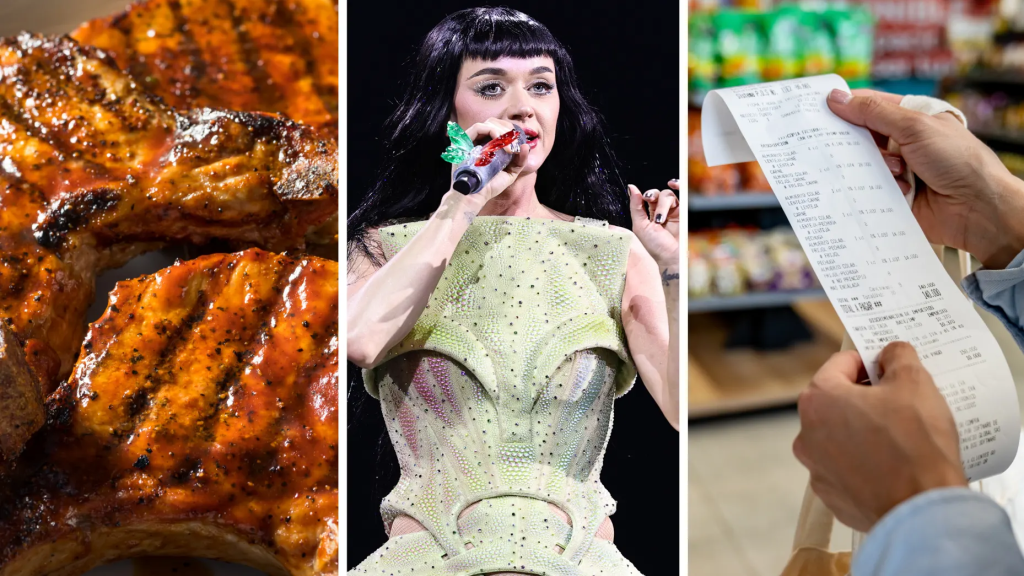
High rates and uncertainties renew ghosts of great recession, while generations exchange survival tips on social networks
A few weeks ago, while Kiki Rough felt more and more concerned about the situation of the American economy, she began to think of previous periods of financial difficulties. Rough remembered the skills he learned to make the groceries yield during the difficult times that accompanied the past economic crises. Facing similar feelings of uncertainty about the country’s financial future, she began creating videos with cooking books published during previous recessions, depressions and periods of war.
At 28, she told followers that she is not a professional chef, but she learned to cook as she depended on meal vouchers. In her yellow and black kitchen, in the suburbs of Chicago, she teaches viewers how to prepare cheap meals and homemade replacements for items such as breakfast or donuts. It often resembles people to replace ingredients with alternatives they already have in the pantry.
“I see this joke repeatedly in the comments: ‘The poor old teaching the new poor,’ Rough told CNBC. “We just need to share knowledge now, because everyone is scared, and learning will give people the security to deal with these situations.”
Autonomous consultant videos quickly won audiences on Tiktok and Instagram. Between the two platforms, she has gained 350,000 followers and about 21 million views in recent months, according to her count.
President Donald Trump’s announcement in early April about wide and high tariffs has increased the fear that the US economy in recession in recent weeks. As Americans like Rough are increasingly concerned about the future, they are remembering the tips and tricks they used to survive during dark financial chapters, such as the 2008 global financial crisis.
Google foresees an increase in searches this month because we have reached recession that marked the late 2000s. Research by “global financial crisis” should reach levels not seen since 2010, while searching for “great recession” should reach the highest level since the beginning of Covid’s pandemic.
Pork chops, parties at home and ‘Jungle Juice’
At Tiktok, a group of millennials and generation X assumed the role of older siblings, offering younger memories and advice on how to save money. Some of generation Z have asked for the elders to insight about what it is like to live a recession at this stage of life, as they were very young to feel the complete effects of the financial crisis.
“This is potentially, at least on a large scale, the first time millennials can be ‘experts’ on something,” said Scott Sills, a 33 -year -old marketing professional from Louisiana. “We specialize in having the carpet pulled under us.”
Those who give the advice are revisiting the late 2000s. Cheap trips to Florida were the norm, instead of luxurious walks abroad. They had pastes to store receipts if expensive items entered promotion later. Casual social clothing were common at events because they could not pay for various styles of clothing.
Pork chops were an ordinary dish due to the affordable cost, leading a content creator to declare that they “taste” of the great recession. They drank “Jungle Juice” at home parties – a mixture of cheap drinks – instead of bars cocktails.
“There are things I didn’t realize that they were ‘recession indicators’ the first time, because I thought they were just trends,” said Ma Lakewood, a professional writer and collector inside New York. “Now you can see from afar.”
Of course, part of the debate revolves around how inflationary pressure has made many of these obsolete tips. Some content creators have pointed out that the federal minimum wage has been $ 7.25 since 2009, while the cost of living has shot.
Kimberly wedding recently started a series on Tiktok showing recipes from a 2009 culinary book focused on affordable meals. New Jersey’s digital media manager said the costs of what was considered cheap meal at the time increased between 100% and 150%. In addition to sharing price changes, she gives tips on how to reduce costs.
“All aspects of life are so expensive that it is difficult for anyone to survive,” said marriage. “If you can reduce the cost of a $ 5 meal, it’s already a victory.”
‘Something very human’
This type of community sharing is common in times of economic tightening, according to Megan Way, a Babson College teacher who studies family and intergenerational economy. While conversations about how to cut costs or make food rendering used to happen among neighbors in the 2000s, Way says it makes sense that now occur in the digital sphere, with the growth of social networks.
“It’s very human to seek others when things are uncertain and try to learn from their experience,” Way said. “This can make a difference to feel that you are preparing. One of the worst scenarios for an economy is absolute fear.”
Way says Americans quickly look at the great recession as a guide because this crisis was shocking and widely felt. However, there are important differences between this situation and what the US faces today, such as the absence of rotten debts that caused the collapse of the real estate market.
Still, there is a wide uncertainty today on several fronts – whether linked to the economy, geopolitics or domestic policies, such as reducing civil service or limiting immigration. This can rekindle the feeling of unpredictability about the future that was striking during the great recession, Way said.
In 2025, it is clear that the economic confidence of the average American is plummeting. The University of Michigan Consumer Sentiment Index has recorded one of the worst readings in more than seven decades this month.
With this negative economic perspective, stress increases. When Lukas Battle made a satirical Tiktok about how divorces seemed most common during the great recession, the 27 -year -old comments were full of people talking about their parents recently separating. (Although divorce has been seen as a cultural mark of the financial crisis, data show that the rate really fell during this period.)
“A second wave of divorce is happening now,” Battle said.
Cultural parallels
This is one of several parallels that users of social networks outlined between the late 2000s and today. When videos of a group dancing to Durechii’s hit “Anxiety” came up, several comments at X mentioned a Déjà Vu of the flash mobs, which were common at the time.
The reboot of the Disney of the “Phineas and Ferb” design, which originally debuted in the late 2000s, also brought the era back to light.

The term “recession pop”, which refers to the subgenre of pop music that emerged during the global financial crisis, had a resurgence last year, while Americans dealt with inflation and high interest rates.
Now, in 2025, with the voices choir projecting a recession ahead, pop music brings family sounds.
In 2008, artists like Miley Cyrus, Lady Gaga and Katy Perry dominated the stops. Cyrus and Gaga have released new musicians this year, and Perry started a world tour this week.
“It’s almost a permission to feel good, whether through music or something,” said Sills, Louisiana’s marketing professional. “It is not necessarily ignoring the problems, but perhaps finding some joy or fun in the midst of all this.”
With information from CNBC*
Source: https://www.ocafezinho.com/2025/04/28/o-fantasma-de-2008-assombra-os-americanos-outra-vez/

